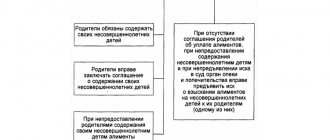Home » Alimony » Is alimony income?
Minors and disabled family members have the right to receive alimony from persons related to them by family ties. Receiving assistance, people with disabilities and parents raising children alone try to improve their quality of life by purchasing material assets on credit, obtaining social benefits, and subsidies.
At the same time, citizens are required to provide a certificate of financial status, and a dilemma arises: is alimony the income of the recipient or not? Most often, mothers who have filed child support ask this question, because when they receive money into their account, they have the right to spend it only on the needs of the minor.
What is alimony?
First, let's figure out what alimony actually is?
According to the Family Code of the Russian Federation, these are payments in cash or in kind intended for the maintenance of minor children, or adults, but for certain reasons, unable to earn (disabled) children, former spouses and other categories of citizens specified in this law. Alimony can be paid on the basis of a court decision, or on the basis of a written agreement concluded between the payer and the recipient of alimony. At the same time, it does not matter at all whether the parents of the child or children are in a registered marriage or not, whether they have ever been in an official relationship, or are divorced. Parents always have a responsibility to support their children. However, if one of the parents does not want to do this voluntarily, then he has to do it forcibly.
When making payments for a child, the recipient of alimony is the parent or other legal representative with whom the child lives. However, he can only spend money on the maintenance of the child himself. A child cannot independently receive alimony for himself and spend it on his own, due to his age and the content of certain prohibitions in the civil legislation of the Russian Federation.
How is child support income calculated?
Expert opinion
Tikhonov Viktor Stanislavovich
Lawyer with 10 years of experience. Specialization: civil law. Member of the Bar Association.
So, despite the fact that technically alimony belongs to a minor child, the mother (father) must still indicate it as one of the sources of income...
- when receiving a subsidy;
- when receiving free baby food;
- when applying for additional social benefits and payments;
- when filling out a tax return, if according to the law the mother (father) is required to provide information about income;
Important! According to paragraph 5 of Art. 217 of the Tax Code of the Russian Federation, alimony is not subject to taxation.
- when lending from a bank;
- in the preparation of other financial statements.
But whose income is alimony considered - the mother’s income or the child’s income?
It all depends on whose content they were directed at. Family law provides for the obligation of parents to support children, both minors and adults, but disabled, as well as the obligation of spouses to support each other.
In accordance with Article 60 of the RF IC, if alimony is paid for children, then it can only be spent on their needs - maintenance, education and food. The parent who remains with the child does not have the right to spend the money received for the child on needs not related to him. The alimony payer has the right to check the expenditure of the allocated funds and demand a corresponding report from the alimony recipient.
Therefore, alimony paid for minor children is their income. But, due to the norms of civil law, a minor child cannot independently manage his income, therefore all transactions for him and in his interests are carried out by his parents or other legal representatives. However, from the age of 14, children can already make transactions on their own behalf, but still only with the permission of their parents.
If one of the spouses, by a court decision or written agreement, sends funds to the second spouse for his maintenance, such funds are the income of the spouse to whom they were sent and can be spent by him at his own discretion.
Income concept
On the one hand, in accordance with established practice, this can be called any amount received by a person: from wages or pensions to winning the lottery.
On the other hand, the Tax Code, while listing types of income in Articles 248–250, does not mention alimony payments.
The same document, however, recognizes alimony as income - in paragraph 5 of Article 217. Here are the most important characteristics of such deductions:
- they are received by the taxpayer - it does not matter whether he is a citizen or a resident;
- they are not taxed.
These provisions fully determine the legal status of alimony paid to a disabled person, an elderly relative or a pregnant mother if she is divorced from the father of the unborn child.
The position of the most common financial contributions, for the maintenance of common children, remains not entirely clear.
In accordance with Article 60, parts 2 and 4 of the Family Code, these amounts are fully due to the child, however, due to the inability for him to manage his own funds, they come at the disposal of the parent with whom the minor lives.
At first glance, alimony, which is the child’s income, should not be declared by the father, mother or adoptive parents.
However, the legislator does not prohibit using funds received in this way for the general needs of the family.
These include the purchase of food, sanitary items, payment for sanatorium treatment, even the purchase of a car or apartment - of course, provided that the child will also use all this.
Expert opinion
Tikhonov Viktor Stanislavovich
Lawyer with 10 years of experience. Specialization: civil law. Member of the Bar Association.
Since part of the benefits in such a situation goes to the relative who spends the alimony payments, the latter must indicate them as income - for example, when applying for a loan.
Is alimony considered as total family income for a loan or a mortgage?
When filling out the appropriate applications at the bank for a loan or a mortgage, it is worth indicating as income the alimony payments received. However, this does not guarantee that the loan or mortgage will be approved. The bank independently determines the solvency of the citizen who applies to it and does not provide a report on the reasons for its approval or refusal.
It is quite possible that the bank will refuse to take into account the funds received as alimony for a minor child, because they cannot be spent on repaying the loan, but are intended exclusively for the maintenance of the child - buying him food, clothing, paying for kindergarten and other needs.
In banking practice, there are also cases when the mother indicates alimony as the only source of family income. And in such a situation, as a rule, the bank refuses to issue a mortgage or loan, even if the amount of monthly alimony paid is quite high and can cover both the loan repayment and other expenses for the child and family.
The fact is that the large amount of alimony paid by agreement between the spouses can be changed at any time by a court decision if the payer’s family or other circumstances change. And banks, knowing this, are not always ready to take such risks.
There is another big risk for the bank. In case of non-payment of loan payments, the bank will not be able to collect the amount of the resulting debt, even if it has a corresponding court decision in hand. The fact is that according to the law, it is impossible to seize and collect debts from funds received as alimony.
Therefore, it is possible to indicate alimony as income in loan applications, however, this will not guarantee a positive response from the bank.
Accounting for alimony when applying for benefits
- From what moment (date) is child support calculated?
The basic indicator for receiving certain benefits and government subsidies is the amount of income per family member, calculated by summing up all family income received and then dividing by the number of people. Is alimony taken into account when calculating average per capita income?
Alimony payments should be taken into account as part of the income component of the family:
- when applying for child benefits;
- when assigning a housing subsidy;
- when receiving preferential meals in preschool and secondary educational institutions;
- when registering the status of a low-income family.
Benefits and compensation payments provided by the state are aimed at financing the needs of the family, and the child in whose favor alimony is paid is a member of the family. Therefore, the question: is alimony included in the family income to receive additional benefits and compensation from the budget has a clear positive answer.
If, in accordance with the law, at the end of the calendar year, at the end of the calendar year, the recipient is required to submit a tax return on income received to the fiscal service for recalculation of personal income tax, then in order to avoid misunderstandings, the amount of alimony payments must be reflected in the reporting. Reflection on part of the income does not have tax consequences, since alimony is not a source of income subject to personal income tax.
Getting a loan
Child support at the disposal of the parent with whom the child lives can be indicated not only in the income statement and when filling out an application for a subsidy, but also when applying for loans - in particular, for a mortgage.
The bank assesses the situation in exactly the opposite way: the higher the family income, the more likely the application will be approved.
However, there is a difficulty here too. Loans are usually taken out for a long period of time, and the child who provides part of the family budget will sooner or later reach the age of eighteen. The receipt of alimony will stop, and at the same time the solvency of the borrower will decrease.
Thus, it will not be difficult to obtain a “short” loan that does not extend beyond the date of cancellation of alimony payments, if other mandatory conditions coincide.
The bank has the right to refuse long-term loans, since it has no idea whether the borrower will be able to repay the money after part of the income to the family budget disappears.
Example 3. Citizen B. plans to purchase a car on credit. Since it will be used by the whole family, it is also allowed to spend child support payments on it. According to the bank’s calculations, the monthly payment will be 15 thousand rubles. Citizen B. herself receives a salary of 15 thousand rubles, and for two minors - a total of 25 thousand rubles in alimony. The duration of loan payments is 7 years. Considering that the eldest child is already 15 years old and in three years part of the income to the family budget in the amount of 15 thousand rubles will cease, the bank refused to issue borrowed funds due to the high risk of non-repayment. At the same time, if at the time of the expected full repayment of the debt both children had not yet turned 18 years old, approval would most likely have been received.
The listed nuances do not apply to alimony received by an adult: they clearly relate to the recipient’s income and must be fully indicated both in declarations and when filling out applications for loans or benefits.
Your rating of the article
What is included in the income category?
The Tax Code of the Russian Federation states that income is a benefit that a person receives in cash or in kind. In other words, the concept of profit can be interpreted as monetary or material income that a person can receive as a result of his actions. The income category includes the following types of payments:
- salary;
- business income;
- bonuses or rewards;
- pension;
- compensation;
- benefits;
- other payments.
According to clause 5 of Article 217 of the Tax Code of the Russian Federation, alimony is also classified as an income item. Taxes may be assessed on such proceeds or they may be seized.
Guided by such provisions of Russian legislation, alimony can be considered income, which is no different from wages and is used to fully support the child.
Receiving subsidies
The parent with whom the minor remains has the right to apply for, in addition to alimony, additional assistance from the budget in the form of:
- benefits for the poor;
- food benefits;
- other types of subsidies.
In each of these cases, when filling out an application, you must indicate the total family income.
To the salary, pension, and other profits received by the parent, one should also add alimony that the former spouse pays for the maintenance of children or for the pregnancy of the former spouse.
After summation, the amount due to each family member is calculated. If it is below the subsistence level established for the region of residence, a subsidy will be assigned; otherwise, most likely not.
Example 2. Citizen B., raising two children, applies for social benefits for the poor. In the application, she indicates her official income (15 thousand rubles) and the alimony she receives for her first (15 thousand) and second (10 thousand) children. The total per family is (15,000+15,000+10,000), that is, 40 thousand rubles. This is (40,000/3), or 13,333 rubles per person. The family lives in the Kemerovo region, for which the cost of living at the beginning of 2020 is 10,972 and 10,712 rubles for adults and children, respectively. Since the income per family member is higher than this “norm,” the benefit will be denied. At the same time, if the father transferred not 15, but 10 thousand rubles to support the older child, the average per capita income would be only 10 thousand rubles, and the benefit, in the absence of other obstacles, would be assigned.
Are there any restrictions on how alimony can be spent?
The child support payer has the opportunity to file a lawsuit if he believes that the money for the child is not being used rationally. In this case, a bank account will be opened for the minor and part of the alimony will be transferred to it, but not more than half of the total amount.
After the child turns 18, he has the right to manage the funds in the account to pay for education, purchase real estate, and more. Before this, money from the account can only be used if permission is given by the guardianship and trusteeship authorities.
Before three years there are some rules, after three - others.
Let us note that for children under three years of age the criteria for the so-called “Putin benefit” are different.
The benefit itself is twice as large - one subsistence minimum, and not half, as after 3 years.
In addition, the criterion of need differs significantly. A family receives benefits if the income per person is below two subsistence minimums. Many families fall under this criterion, while after the child turns three years old, the circle of recipients narrows significantly. Families recognized as needing benefits for up to three years are no longer classified as low-income for benefits up to seven years.
Is it possible to withhold tax on alimony payments?
According to Article 217 of the Tax Code of the Russian Federation, alimony is a subsidy that is not subject to tax deduction, since economic benefits cannot be obtained from payments to a minor child.
There is no need to pay tax in the following cases:
- when receiving a difference due to exchange rate exchange;
- in case of property/non-property relations between relatives (grandparents, spouses, etc.);
- upon return of the authorized capital to the owner (or co-owner) of the enterprise.
Also, the amount of alimony is determined based on the official income of the alimony payer, from which taxes are withheld in favor of the state. To avoid double taxation, such encumbrances on alimony payments are removed.









